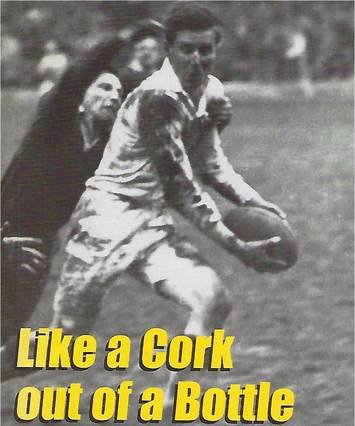Half an hour's drive from where we live on the Welsh border is Hay-on-Wye, well-known for its beautiful surrounding country and its many second-hand book shops.
An easy place to browse and find surprises.
One such surprise was Christ in Shakespeare, a series of addresses given in a church in Glasgow by a Scottish divine, George Morrison, in 1928. In it he writes:
There are temptations peculiar to the hour of failure. Men are tempted to fall back on things they have foresworn - lose heart, grow bitter, begrudge the success of others, take up a quarrel with the world, forfeit the sunshine of the love of God.
But other temptations strike at men in the hour of success. Success is always apt to dim the grandeur of the moral law. The witches met Macbeth in the hour of his success, and they appealed to his ruling passion, ambition.
Macbeth gains the world, and loses his soul.
Evil alone ruins and destroys. It may be the evil of indecision as with Hamlet, or ambition as with Macbeth, jealousy as with Othello, ingratitude as with Lear.
Choice depends on character. We choose by what we are.
Nowhere in literature is the power of conscience more pictured than in Shakespeare.
I read Shakespeare through in my 30s but reading this book encouraged me to read him through again, and explore him further. It took me three weeks. It is an exciting thing to soak yourself in a great mind.
He left school at 16 - never went to college, partly because his father got into debt. He helped his father at the butchery and the glover's bench. He spent about 20 years of his life on the road, writing his plays principally round the team of actors that travelled with him, often acting in the plays himself. And he sent his earnings home to his wife, who never moved beyond Stratford in her life. While he travelled he read the history that gave the content for his historical plays. But most of the content came from his daily life as he met it on the road. His fortune, he said, was that he remembered what he saw and heard - he could draw from a 'deep well of images'.
He had grown up reading the Bible and the Prayer Book, and knew some of the Psalms by heart. In this way he was nourished by the riches of the English language.
I was almost taken by surprise to see the spiritual thread that runs though his plays and poems, as well as the sense of humour - 'Enter fool', 'enter clown', 'enter ghost', 'enter murderer', - what wonderful original ways to bring in a different note.
A love of country shines through. 'The fair green lap of good King Richard's land' was my father's favourite line.
Shakespeare died at 58. His years were 1558-1616. He had exhausted himself. He left behind an amazing legacy of thought, and a unique insight into human nature: and deep truths round which we can build our lives.
Here are some of them:
Our doubts are traitors
And make us lose the good we oft might win
By fearing to attempt.
Measure for MeasureHappy are they that hear their distractions
And can put them to mending.
Much Ado about NothingThe man that hath no music in himself
The motions of his spirit are dull as night,
Let no such man be trusted.
The Merchant of VeniceBe not afraid of greatness.
Twelfth NightTruth hath a quiet breast.
Richard IIThe strawberry grows underneath the nettle.
Henry VThe empty vessel makes the greatest sound.
Henry VSmooth runs the water when the brook is deep.
Henry VI Part 1A heart unspotted is not easily daunted.
Henry VI Part 1Look, when he fawns, he bites.
Richard IIIHe hath no friend but what are friends for fear.
Richard IIILove thyself last: cherish those hearts that hate thee: corruption wins not more than honesty.
Henry VIIIThose moral laws of nature and nations speak aloud.
Troilus and CressidaPerseverance keeps honour bright.
Troilus and CressidaI talk of dreams
Which are the children of an idle brain
Begot of nothing but vain fantasy.
Romeo and JulietCicero will never follow any thing that other men begin.
Julius CaesarVaulting ambition, which o'erleaps itself.
MacbethTo be honest as this world goes
Is to be one man picked out of 10,000.
HamletDeath, the undiscovered country.
HamletWhere I could not be honest
I never yet was valiant.
King LearIn nature's infinite book of secrecy I can read.
Antony and Cleopatra
English


